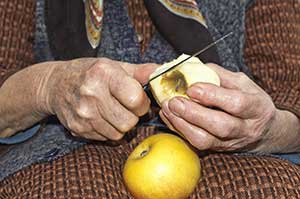Search
Grim Details Emerge Regarding Malnutrition In Kentucky Nursing Home
As we recently discussed, Winchester Centre for Health and Rehabilitation may lose its Medicare and Medicaid funding if it fails to correct the dangerous conditions inspectors have recently found at the facility. The federal Centers for Medicare and Medicaid Services have given the facility a February deadline to correct the problems or federal aide will be pulled and daily fines will be imposed.
The Lexington Herald-Leader, ran an article detailing the deficiencies documented in recent inspections of the facility obtained via the Open Records Act. Among the more disturbing situations detailed in the report:
 A resident lost 87 pounds during a 19 day admission to the facility
A resident lost 87 pounds during a 19 day admission to the facility- Staff repeatedly failing to notify physicians for deterioration of residents physical condition
- Administering the wrong dosage of an anti-seizure medication for 40 days to a resident. The resident was prescribed 450 milligrams of extended release capsules by mouth, but the nursing home staff gave the resident 400 milligrams by feeding tube, which altered its effectiveness. Consequently, the patient suffered a seizure.
- Staff failed to follow doctors orders for patients with serious medical conditions
- Problems with cleanliness, equipment disrepair, and temperature of food served to residents
What is particularly disturbing about these findings, is that the nursing home staff acknowledges the poor conditions- yet was ineffective in doing their job to stop them from occurring in the first place. When questioned by a state inspector about the precipitous weight loss of a resident, the medical director of the facility stated, “It was not a good experience during his three-week stay, and I think he suffered for it.”
Malnutrition In Nursing Homes
Poor nutrition and dehydration are common in nursing home residents and are associated with many adverse clinical outcomes. OBRA (Omnibus Budget Reconciliation Act) guidelines require nursing homes to provide adequate nutrition to their resident.
Despite facilities obligation to provide proper nutrition to its residents, two out of five nursing home residents suffer from malnutrition, and dehydration. Malnutrition in nursing home residents can occur for a variety of reasons, including the resident’s inability to process food and ill-fitting dentures. Dehydration can occur for a variety of reasons as well, including diarrhea and the effects of medication. Unfortunately, malnutrition and dehydration can also occur due to a nursing home’s negligence in a variety of situations, including:
- Failure of the nursing home to employ adequate staff, which results in the staff’s inability to properly feed the residents
- Failure of the staff members to pay adequate attention to those residents needing assistance with eating
- Failure of the nursing home to properly educate the staff on nutrition and feeding methods
- Failure of the nursing home to provide proper supervision over those who provide nutritional services
- Reliance on liquid supplements as opposed to making sure each resident eats enough food to get necessary vitamins, minerals, protein, and calories
If you notice that your loved one has signs of malnutrition or dehydration or if you think that they are not getting enough food or fluids at the nursing home, you should immediately notify the nursing staff and the physician to prevent potentially serious, life-threatening consequences.
For more information on nursing homes in Kentucky look here. For laws related to Kentucky nursing homes, look here.
 Nursing Home Law News
Nursing Home Law News

